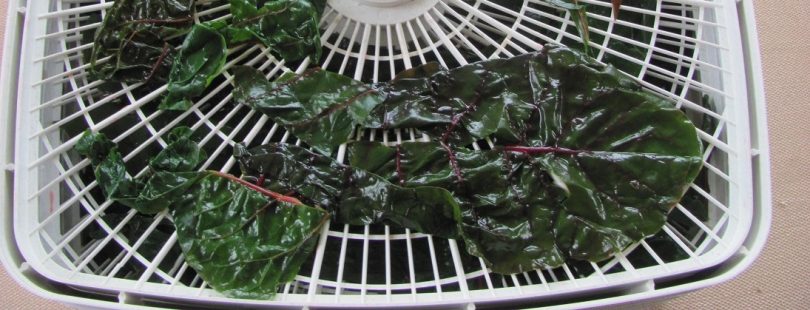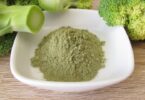Learn how to dehydrate Swiss chard at home, and preserve dried swiss chard for later use!
Swiss chard is a green vegetable that is packed in nutrients. It can pair well with practically any meal. Whether you keep a stock of store-bought Swiss chard or you plant and harvest your own, it is a good idea to always have some Swiss chards readily available in your kitchen.
There are various ways to preserve the vegetable, and significantly extend its shelf life. You can freeze, refrigerate, can, or dehydrate Swiss chard. This post will discuss various ways on drying Swiss chard, and properly storing the dried vegetable.
READ ALSO: How to Dehydrate Food Successfully: A Beginner’s Guide
How to Dehydrate Swiss Chard
Similar to other leafy green veggies, Swiss chard has high oxalate levels. This can cause stones to form in your body, eventually leading to health problems, particularly in your kidneys.
Thus, it is best to blanch the veggies before consuming them. You can blanch the Swiss chards for about a minute. Make sure to drain the water before dehydrating.
Here is a nice video on how to blanch Swiss chard.
There are various ways to dehydrate Swiss chard. Here are the easiest methods for dehydrating Swiss chard at home.
Dehydrating Swiss chard in a food dehydrator
- Pick the chards to dehydrate. Choose undamaged ones.
- Remove the stems and cut the leaves into smaller pieces (4” for example). You can also remove the center rib of the chard. If you want, you can dehydrate the stems as well. Just cut them into smaller pieces before dehydrating.
- Wash the vegetables, then pat them dry. Balance before dehydrating the veggies.
- Lay the chard slices flat on the dehydrator trays, making sure there is enough breathing room between slices.
- Turn the food dehydrator on; set it at a low temperature or about 135F.
- Allow dehydrating for around 3 hours. Check for dryness.
Once completely dry, remove from the dehydrator. Allow to cool down at room temperature. Store the dried Swiss chards in airtight sealed containers. (More on proper storage in a later section.)
READ ALSO: A Guide for Beginners: How to Dehydrate Food with a Dehydrator
Dehydrating Swiss chard in an oven
The preparation process for dehydrating Swiss chard in the oven is the same as described above.
After you have cut, blanched and dried the card …
- Lay the chard pieces in one layer on a cookie sheet covered with parchment, then place inside the oven.
- Set the oven temperature at the lowest heat setting or around 150F. It should take a couple of hours at least to completely dehydrate the Swiss chards. You can leave the oven door slightly open for better air circulation.
- Check the level of dryness every hour. You will know that the vegetables are completely dry when they easily crumble.
Once dry, remove from the oven and set aside. Allow to dry at room temperature. Store the dried Swiss chards in airtight sealed containers.
Sun-drying Swiss chard
This method will work only if you have warm, sunny days on a regular basis. The Swiss chard will completely dry up in a couple of days, at least. However, sun drying will not work for you if you live in a cold area or where it is constantly raining.
- With parts of the stems attached, string the leaves as you would other herbs.
- Slit the stems with a knife. Insert twine so you can hang the leaves. This works well with large and nice leaves with firm stems. However, when drying smaller pieces, you can use a needle and thread to bind and hang the vegetables.
Once completely dry, store the dried Swiss chards in airtight sealed containers.
How to Preserve Dried Swiss Chard
Proper storage of dried Swiss chards can help preserve the shelf life of the veggies for a longer period of time, unlike when storing them fresh.
- Once done dehydrating the Swiss chards, set them aside and allow to cool down at normal room temperature. Pack the dried veggies in sealed, airtight containers. It is best to use glass containers to prevent chemical reaction with the veggies.
- Keep the containers in a cool, dark place to prevent the Swiss chards from going bad. You may store the dried veggies in the refrigerator or freezer to help retain the quality of the dried Swiss chards.
- If you want to achieve optimum quality for your dried veggies, keep them in the freezer, constantly frozen. This way, you can enjoy Swiss chard in your soups all throughout winter – and even beyond.
Even when you pack them in sealed containers, dried Swiss chards may still spoil if you keep them in a room with humid and hot conditions.
When you are ready to use the dried veggies for cooking, just rehydrate them by soaking in warm water for a few minutes.
Before using, check whether your dried Swiss chards are still in good shape or they’ve gone bad. You can check by smelling and closely examining the veggies. If they appear bad or you smell something off, discard them. Don’t use them as well if you notice some mold.
SEE ALSO: How to Store Dried Vegetables – Methods, Pros, and Cons
Health Benefits of Dried Swiss Chard
Swiss chard is known to offer numerous health benefits. Following are some of the major benefits of consuming Swiss chard:
- The vitamin K content of dried Swiss chard helps prevent bone weakness by enhancing your bone strength. It also helps you maintain your bones’ overall health.
- The green leafy veggie is a generous source of antioxidants that help prevent various liver ailments.
- Making Swiss chard a part of your regular diet can help you maintain normal blood pressure levels, or lower your high blood pressure.
- Swiss chard contains phenolic compounds that are known to fight and destroy cancer cells.
- The vegetable may have the potential to prevent cognitive decline, although further studies are necessary to prove this claim.
- Dried Swiss chard contains biotin that can considerably improves your overall skin health.
- Dried Swiss chard helps protect your eyes from various eye diseases as it contains many nutrients that promote eye health.
- Eating Swiss chard on a regular basis is good for your heart as it contains heart health-supporting potassium.
- Dried Swiss chard is also loaded in iron that helps lower your risk of anemia.
Swiss chard is packed with a lot of nutrients, and is perfect for use in almost any dish you can think of, particularly in soups. By dehydrating Swiss chard, you are assured of a ready supply of your favorite veggie any time of the year.





